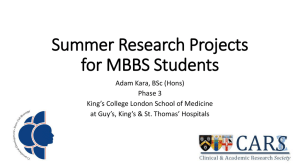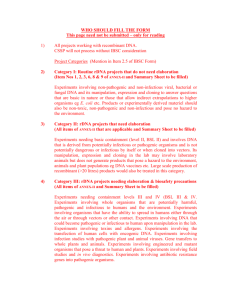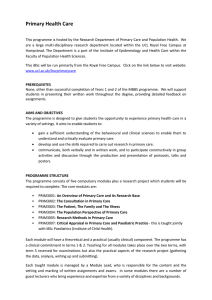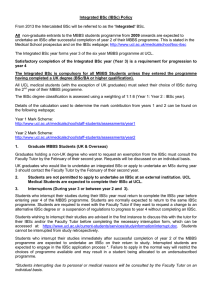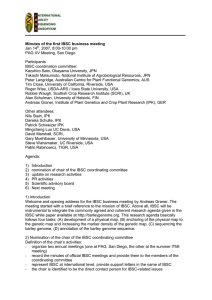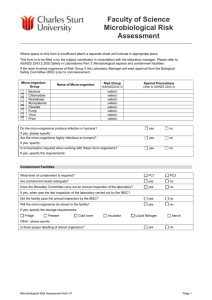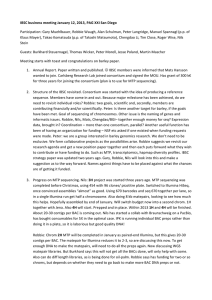Intercalated BSc (IBSc) Review 2010 Review Group Membership September 2010
advertisement
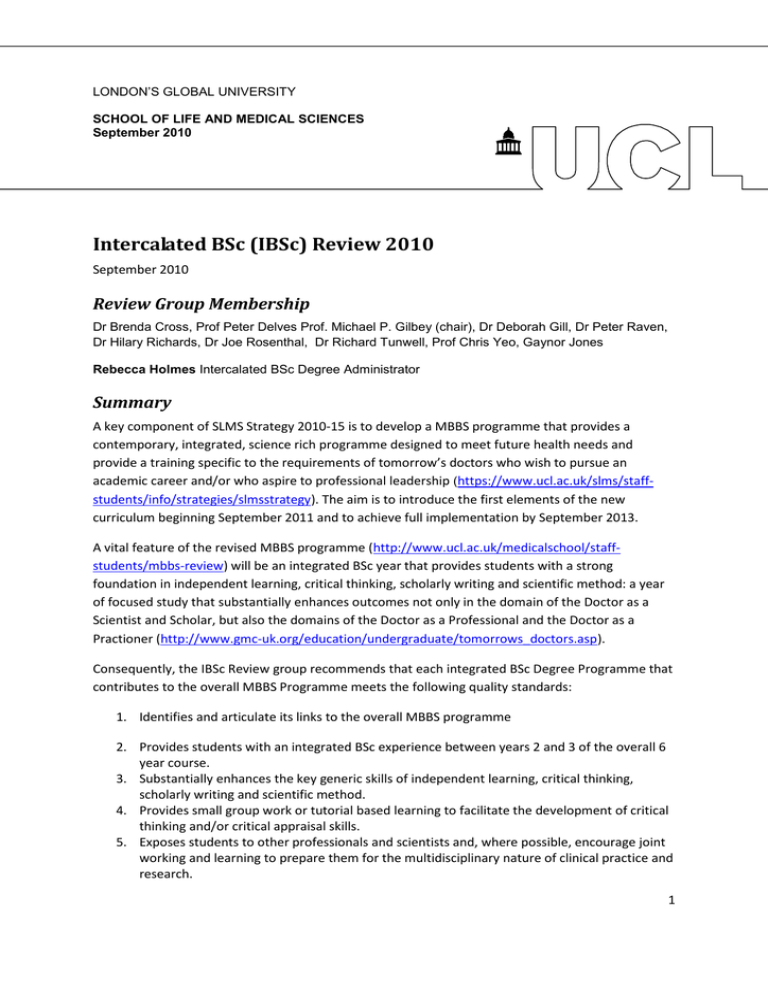
LONDON’S GLOBAL UNIVERSITY SCHOOL OF LIFE AND MEDICAL SCIENCES September 2010 Intercalated BSc (IBSc) Review 2010 September 2010 Review Group Membership Dr Brenda Cross, Prof Peter Delves Prof. Michael P. Gilbey (chair), Dr Deborah Gill, Dr Peter Raven, Dr Hilary Richards, Dr Joe Rosenthal, Dr Richard Tunwell, Prof Chris Yeo, Gaynor Jones Rebecca Holmes Intercalated BSc Degree Administrator Summary A key component of SLMS Strategy 2010-15 is to develop a MBBS programme that provides a contemporary, integrated, science rich programme designed to meet future health needs and provide a training specific to the requirements of tomorrow’s doctors who wish to pursue an academic career and/or who aspire to professional leadership (https://www.ucl.ac.uk/slms/staffstudents/info/strategies/slmsstrategy). The aim is to introduce the first elements of the new curriculum beginning September 2011 and to achieve full implementation by September 2013. A vital feature of the revised MBBS programme (http://www.ucl.ac.uk/medicalschool/staffstudents/mbbs-review) will be an integrated BSc year that provides students with a strong foundation in independent learning, critical thinking, scholarly writing and scientific method: a year of focused study that substantially enhances outcomes not only in the domain of the Doctor as a Scientist and Scholar, but also the domains of the Doctor as a Professional and the Doctor as a Practioner (http://www.gmc-uk.org/education/undergraduate/tomorrows_doctors.asp). Consequently, the IBSc Review group recommends that each integrated BSc Degree Programme that contributes to the overall MBBS Programme meets the following quality standards: 1. Identifies and articulate its links to the overall MBBS programme 2. Provides students with an integrated BSc experience between years 2 and 3 of the overall 6 year course. 3. Substantially enhances the key generic skills of independent learning, critical thinking, scholarly writing and scientific method. 4. Provides small group work or tutorial based learning to facilitate the development of critical thinking and/or critical appraisal skills. 5. Exposes students to other professionals and scientists and, where possible, encourage joint working and learning to prepare them for the multidisciplinary nature of clinical practice and research. 1 6. Identifies and articulate its links to UCLPartners academic themes1. 7. Allows sufficient time for students to comply with the overall requirements of the MBBS programme during the Integrated BSc year (for example maintenance of the portfolio). 8. Provides robust personal tutoring in line with UCL requirements. 9. Consists of 4 course units and provides a compulsory laboratory, field, or literature based project: the project contributing between 1 and 1.5 course units. Where the project consists of literature based study this needs to be sufficiently robust to ensure students gain the appropriate competencies in data analysis and interpretation. Working with the Medical School Quality Assurance Unit a strategy group will be responsible for ensuring that all programmes are of excellent quality, are aligned to the needs of The UCL Doctor and that an appropriate range of BSc Degree Programmes are available. To cover administrative costs of the IBSc programme each integrated BSc Degree Programme provider will need to make a contribution to IBSc Programme proportionate to the associated HEFCEt income. Integrated BSc Degree Programme providers will be required to complete an annual return to enable the strategy group to assess the compliance of their programme against the requirements outlined above. The suggested deadline for full compliance is September 2012 to meet the revised curriculum implementation date of September 2013. Where quality standards cannot be met by a programme the strategy group will recommend discontinuation of that programme. While working to maintain an appropriate breadth of degree programme choice, it is likely, given current financial constraints, that some of the current IBSc degree programmes will be identified as uneconomic in their current form. Such programmes will either have to merge with suitable partners, broaden their intake or discontinue. Contents 1) Background 1.1 Purpose of the Review 1.2 Terms of Reference 2) General Purpose of IBSc Programme 3) The range of degree programmes appropriate for inclusion in the IBSc Programme 3.1 Number of IBSc Programmes 3.2 Programme Requirements 4) The Timing of the IBSc programme within the MBBS 5) Mechanism for allocating IBSc degree programme student quotas 1 Either the programme’s links to the UCLP emerging research theme areas or the overall themes of: harnessing academia to effect health gain; improving the health of populations locally, nationally or globally; illness prevention or the role of primary care/novel service provision. 2 6) Recommendations on the selection process 7) Proposals for the equitable and appropriate allocation of resources for the IBSc programme, including bench fees and HEFCEt allocations 8) Essential criteria for IBSc programmes within the MBBS course at UCL 9) Proposed strategy for quality management and enhancement (QME) and development of the IBSc programme 1) Background The UCL six year MBBS programme aims to produce a UCL Doctor who is: “a highly competent and scientifically literate clinician, equipped to practise patient-centred medicine in a constantly changing modern world, with a foundation in the basic medical and social sciences” The IBSc degree programme is an integral and key component in the education of The UCL Doctor. During the IBSc year students have an opportunity to study topics in greater depth than during the other phases of their undergraduate medical studies. It also affords them an opportunity to develop their skills as a clinician researcher: to become familiar with research literature, scientific methods and techniques and the current state of thinking in their selected area. Currently, the degree programme is made up of modules. Modules usually have a value of 0.5, 1.0 or 1.5 course units (CU). A 1.0 CU module has up to 40 hours of lectures and a total work load (including private reading, preparation of course work and revision) of 200 to 300 hours. Each 0.5, 1.0 and 1.5 CU module has its own assessment components which include an examination and/or course work. All IBSc degree programmes consist of 4 course units. A degree programme is defined by its module content: some have CORE MODULES which must be taken. Presently not all modules are core and therefore it is often possible to take optional modules. In all such cases the IBSc programme tutor must approve the choice of modules. In addition the department/division teaching the course approve applications before students join a programme of study as there may be constraints imposed by prerequisites, the timetable or student numbers.2 The IBSc should provide an excellent foundation for future research work. From the viewpoint of clinical training and career options, it should be relatively unimportant which particular programme is chosen; the training given in approaching problems scientifically should be a common feature of them all. 1.1 Purpose of the Review The current review was initiated to examine aspects of the IBSc Programme considered crucial to the delivery of the best possible student experience, to the enhancement of outcomes for medical graduates in the three domains outlined in Tomorrow’s Doctors 2009 (the Doctor as a Scholar and 2 information source Intercalated BSc Degrees 2010-2011 Guide (http://www.ucl.ac.uk/medicalschool/bscibsc/booklet_2010-2011.pdf 3 Scientist, the Doctor as a Practitioner and the Doctor as a Professional)3and to ensure that the IBSc programme is fully integrated into the undergraduate MBBS programme stream . The IBSc Programme has the potential to contribute a substantial element to the development of the Doctor as a Scholar and Scientist domain; a domain that is embedded in all six years of the course. The review group’s recommendations relating to the aspects of the IBSc programme outlined in the terms of reference are provided in subsequent sections, including a strategy for quality management and enhancement, and programme development. 1.2 Terms of Reference (TOR) 1) To review the general purpose of the IBSc programme in the overall MBBS programme 2) To define the range of degree programmes appropriate for inclusion in the IBSc programme 3) To define the optimal timing of the IBSc programme in the overall MBBS programme 4) To make recommendations on how the number of students entering each IBSc programme will be allocated and managed 5) To make recommendations on the application process 6) To make proposals for the equitable and appropriate allocation of resources for the IBSc programme, including bench fees and HEFCEt allocations 7) To develop a coherent and integrated strategy for the quality management and the future development of the IBSc programme 2) General purpose of the IBSc Programme The purpose of the IBSc Programme, which consists of a number of IBSc Degree Programmes, is to significantly enhance learning in the MBBS programme. Additionally, the IBSc programme should provide a suitable preparation for those opting to follow the MBPhD programme. To achieve these goals IBSc Degree Programmes should: encourage the development of the key skills of independent learning, critical thinking, scientific method, critical writing, laboratory practice and dissertation writing provide students with an opportunity to enhance their knowledge in one or all of the following areas of science: biomedical, social and behavioural The review group considers that while most IBSc Degree Programmes tend to be robust with respect increasing the factual knowledge base of students, in some programmes work is required to ensure further development of skills in the domains of independent learning, critical thinking, scientific method, critical writing and laboratory practice. Evidence for this view is found in students’ course work, examination performance and Degree Programme pedagogy. In such cases workshop/tutorial and laboratory sessions and new methods of assessment should be introduced and the students ought to be made fully aware of the skills that they should try to develop during their IBSc year. 3 Tomorrows Doctors 2009 - http://www.gmc-uk.org/education/undergraduate/tomorrows_doctors.asp 4 Furthermore, it may be appropriate to use the period following the summer examinations in the preceding academic year to prepare students for their IBSc year. During the IBSc there must be ample opportunity for students to maintain their overall development as a doctor, for example maintain their clinical contact and continue their portfolio: this is not a ‘year out’ of the MBBS programme. 3) The range of degree programmes appropriate for inclusion in the IBSc Programme While being mindful of resource limitations, efficiency and quality management and enhancement, the available programmes should provide a wide range of choice across the subject areas considered to be appropriate for inclusion in the IBSc Programme. All degree programmes must demonstrate that they are financially viable and make a contribution to IBSc Programme administrative costs. 3.1 Number of IBSc Programmes We suggest that a maximum of fifteen IBSc degree programmes, rather than the current twentytwo, may provide an appropriate range of choice while ensuring that a viable number of students enrol for each programme: college quota is normally 290 Home/EU and 15 overseas students. Some of the current degree programmes have a history of fewer than ten students enrolled and therefore they may be uneconomic and consequently either have to discontinue or merge with other degree programmes. Another strategy would be for degree programmes which have thus far only been available to MBBS students to offer their programmes or course units to other UCL students and in doing so satisfy the criterion of “joint working” (see section on Criteria). Those programmes that currently enrol less than ten students may be uneconomic in the long term and should be encouraged and supported to increase their student numbers where there is strong case that the programme is, within the context if the MBBS programme overall, consistent with the UCL partners/Academic Health Science Centre( AHSC) priorities4. We consider that it would be appropriate to offer an IBSc in Cancer Biology particularly considering the development of the new Cancer Institute and the AHSC priorities. 3.2 Programme Requirements In addition to fulfilling the general purpose of the IBSc degree programme we suggest that each programme should integrate as far as possible with the emerging academic themes and research base in UCL partners. All programmes must offer a compulsory laboratory or literature based research project that is supervised by an academic expert in the chosen subject area. All students will be required to demonstrate that they have actively engaged in data analysis (laboratory or literature based). All projects should contribute 1-1.5 CU to a programme of study. In accordance with the new MBBS curriculum all students will take an intergrated BSc degree programme in Year 3 of the 6 year programme (see section below) any programme that cannot accommodate this criterion will be discontinued. 4 http://www.uclpartners.com/research.php 5 All programmes must include workshop/tutorial based activities to help students develop key skills in addition to small group or one to one work associated with the project element of the programme. Where possible programmes should provide students with exposure to other professionals and scientists and encourage joint working and learning to prepare them for the multidisciplinary nature of clinical practice and research. 4) The timing of the IBSc within the MBBS Programme Currently, although students are encouraged to enter the IBSc programme between Phases 1 and 2, some students elect to take their IBSc later in the MBBS programme. As the BSC year becomes fully integrated into the overall MBBS programme all students will complete the integrated BSc in year 3, The main educational reasons for embedding the IBSc programme within year 3 of the undergraduate stream of the MBBS programme are to unify the student experience and to maximize the impact of the IBSc programme on outcomes in the domains of the doctor as a scholar and a scientist, the doctor as a practitioner and the doctor as a professional5 . As a relatively small cohort of students entered the MBBS programme in 2009-2010 there will be sufficient capacity for all undergraduate students to enter the IBSc programme in year 3 while clearing the “backlog” of students intercalating in later years. Thereafter, all students will join the IBSc programme only in year 3 i.e., IBSc year 2012-2013 (see appendix 1) and the IBSc will become the Int BSc from 2013-2014. 5) Mechanism for allocating IBSc degree programme student quotas It is anticipated that the IBSc programme will need to accommodate approximately 295 Home/ European Union and 15 overseas students when all non-graduate students take their BSc studies in year 3 of the 6 year MBBS programme. This indicates that if the college quota is not to be exceeded, few if any external students will be able to join the IBSc programme. It is recommended that no more external students are admitted to the IBSc from 2011-12 and that UCL students will not be allowed to take an external IBSc (see appendix 1). The number of students entering each degree programme will be determined by the programme capacity, student demand and number of the IBSc degree programmes offered. For the reasons considered above, we suggest that no fewer than ten students will enter an IBSc programme. The paradigm shift to commissioning of IBSc means that the number entering each programme will be a function of: 1) degree programme capacity; 2) the number programmes needed to provide the required subject range. Each programme should guarantee a number of places and module options; the easiest way of achieving this may be to have programmes with fixed module contributions – e.g., no options (ringfenced IBSc places on those programmes open to non MBBS students). 6) Recommendations on the selection process Overall academic ranking should not be a tool for assessing a student’s suitability for a programme of study, although achieving a certain level of performance in a relevant Phase 1 module or modules 6 (or other criteria such as having studied a particular A level) should be allowed as a criterion for selection. It is recommended that interviewing is not part of the selection process although the personal statement should remain (see appendix 2). The IBSc selection procedure timeline is documented in appendix 3 An online selection process should replace the current paper based process (see appendix 2). Students should express an interest in two courses so that if they are unsuccessful or put on a waiting list for their 1st choice their reserve choice is promoted. The online system will ensure that reserve choices are selected. Over past years the majority of students have been accepted onto their first or second choice IBSc degree programme. It is suggested that if at all possible students should be allocated an IBSc in a programme of a similar category if they are unsuccessful in their 1 st and 2nd choices (see appendix 2). 7) Proposals for the equitable and appropriate allocation of resources for the IBSc programme, including bench fees and HEFCEt allocations The IBSc Programme funding allocation should be transparent and in the public domain. Once identified, funding should be equitably distributed across IBSc degree programmes. Presently, the funding for the delivery of an IBSc Degree Programme is dependent on the number of students enrolled on the programme and which Faculty or Faculties the staff delivering the programme are members; e.g., if a programme is run solely by FLS FTEs are billed at the “Science” rate whereas if it originates solely from FBS FTEs are charged at the “Clinical” rate. We suggest that the HEFCEt funding allocation is identified and distributed at a single IBSc rate across IBSc Programmes irrespective of faculty. It is current practice within FLS based IBSc programmes that a laboratory projects supervisor receives a bench fee of £300 for each project supervised. It is recognised that this is often an inadequate amount to fully cover the running costs of the project. Therefore all degree programme organisers, where appropriate, need to confirm that they have the funds to support laboratory projects . Currently HEFCEt allocation goes to the Division running the programme. Where staff from more than one faculty are involved in delivering the course, the distribution of funds should be transparent and appropriate with reference to work load. FTEs should be allocated on the basis of defined duties carried out and the work load allocation attached to such duties. 8) Essential criteria for IBSc programmes within the MBBS course at UCL Timing and Selection The IBSc year must be provided to medical students in year 3 of the 6 year MBBS programme as highlighted in section 4. While individual programmes may have certain entry criteria (such as the possession of ‘A’ level physics or satisfactory results in an individual module of the phase 1 course), overall ranking in 7 academic achievement should not be used for allocation of student places. However, an appropriate level of performance in a relevant area of study may be required to enrol on a particular programme or course unit (including laboratory based projects). Programme Orientation and Content The IBSc is part of the medical programme and programme leads will need to provide induction session before the start of the year that orientate medical students to: the programme the skills of independent learning the expected learning in relation to the overall goals of the Doctor as Scientist and Scholar element of the MBBS programme make explicit the clinical and/or research relevance of the IBSc year. The course should provide students with exposure to other professionals and scientists and, where possible, encourage joint working and learning to prepare them for the multidisciplinary nature of clinical practice and research. The programme must clearly address the key generic skills of independent learning, critical thinking, scholarly writing and scientific method. By the end of the IBSc year, building on prior learning in phase 1, students must be able to critically appraise the findings of studies reported in the medical and scientific literature, formulate research questions in biomedical science, psychosocial science or population science, and design studies or experiments to address the questions, apply findings from the literature to answer questions raised by specific clinical problems and understand the ethical and governance issues involved in medical research. The programmes need to identify and articulate their links to the MBBS programme overall and where relevant the UCLPartners academic themes5. The programme needs to allow sufficient time for students to comply with the overall requirements of the MBBS course during the iBSc year (for example maintenance of the portfolio and Early Patient Contact). Teaching methods The IBSc programme must be able to provide small group work or tutorial sessions beyond those associated with the project to facilitate the development of critical thinking and/or critical appraisal skills. IBSc programmes must be able to provide robust personal tutoring IBSc programmes must consist of 4 course units and provide a compulsory laboratory, field, or literature based project. The project must contribute between 1 and 1.5 course units. Where the project consists of literature based study this needs to be sufficiently robust to ensure students gain the appropriate competencies outlined in criteria 5 above. 5 Either the programme’s links to the UCLP emerging research theme areas or the overall themes of: harnessing academia to effect health gain; improving the health of populations locally, nationally or globally; illness prevention or the role of primary care/novel service provision. 8 9) Proposed Strategy for quality management and enhancement (QME) and development of the IBSc programme 2010-2015 From January 2011 UCL will neither customarily accept external applications to the IBSc Programme nor customarily permit UCL students to leave the IBSc Programme to study at external institutions From September 2012 the IBSc programme will run exclusively within year 3 of the 6 year MBBS programme The name Integrated BSc will adopted from September 2013 The key features of the proposed structure to achieve quality management and enhancement are outlined in Fig. 1. The IBSc Steering Committee is established and is responsible for overseeing and monitoring the IBSc programme (http://www.ucl.ac.uk/medicalschool/organisationalstructures/1011-MBBS-2-Committees-June-10.pdf). . To ensure that all IBSc degree programmes are fit for purpose an IBSc strategy group (Sub Dean IBSc, all MBBS Curriculum Sub Deans, FLS Faculty Tutor) will be established and work with the IBSc Steering Committee to: Oversee the annual review that will monitor programme quality and alignment with required MBBS programme outcomes. Provide feedback to degree programme organisers and in cases where programmes have not met the required essential criteria explain the action required to become compliant and the timeline. For the degree programme to remain in the IBSc portfolio the degree programme tutor will be required to produce an action plan that will need to be endorsed by the IBSc strategy group. Commission new IBSc degree programmes/modules and/or discontinue established degree programmes/modules as indicated following review . Ensure that number of IBSc degree programmes offered provide suitable student choice over the range of programmes deemed to be appropriate while being mindful of resource limitations. As part of the monitoring process an IBSc Programme student staff committee will be established and all students will complete a questionnaire concerning their IBSc experience: this questionnaire will supplement degree programme specific feedback. 9 FIG. 1 Objectives for April 2011 Each IBSc Degree Management Group will either provide evidence that their programme meets the essential criteria for IBSc programmes or where there is non-compliance provide details of planned changes, an indicative timeline for changes and any possible barriers to implementation (see IBSc Degree programme Return at end of this document). The IBSc Steering Committee and IBSc Strategy Group will then endorse the IBSc Degree Programme, approve the planned changes and timeline or provide feedback on the rejected action plan. If it is considered that the degree programme could meet the criteria every effort will be made to assist the degree programme organisers to successfully address issues of concern with a view to approval. Full compliance required by September 2012 Degree programmes will be required to become fully compliant by September 2012 for inclusion in the IntBSc programme academic year 2013-14. 10 Appendix 1 Intercalated BSc Policy From 2010-11 all undergraduate students entering the MBBS course will be expected to intercalate after nd successful completion of the 2 year of their programme. This will be stated in the Medical School prospectus and on the Intercalated BSc webpage; http://www.ucl.ac.uk/medicalschool/bsc-ibsc The Intercalated BSc is compulsory for all MBBS Students unless they entered the programme as UK graduate (holding a BSc/BA or higher qualification) All non-graduate UCL medical students must therefore select their choice of BSc programme to during the 2 year of the MBBS programme and Intercalate before entering Phase 2. nd The IBSc classification will be assessed using a weighting of 1:1:6 (Year 1: Year 2 : IBSc year) for both Internal and external students (from 2010 entry to the IBSc year) 1. Graduate MBBS Students (UK & Overseas) Graduates holding an overseas BSc/BA or higher qualification must consult Dr B A Cross by February preceding the upcoming Intercalated BSc Year, should they wish to request an exemption from the Intercalated BSc year. MBBS students who are UK Graduates and who would like to do an Intercalated BSc or apply to do an MSc during the ‘Intercalated year’ should contact Dr B A Cross to discuss the matter by February preceding the upcoming Intercalated BSc Year. 2. Permission to Intercalate externally Students are expected to intercalate at UCL however in special circumstances students can request permission to intercalate at an external UK university. Permission to Intercalate externally must be requested from Dr B A Cross. Failure to secure a place externally will mean the student must intercalate at UCL and may be allocated an IBSc by the IBSc admissions Tutor if the application process has closed. 3. Interruptions (After Phase 1 and during Intercalated BSc Year) Students who interrupt during their intercalated BSc year must return to their IBSc year before entering the next phase of the programme (if an exemption is required this should be discussed with Dr B A Cross) Students cannot be interrupted from study retrospectively. nd Students who interrupt after the 2 year of the MBBS programme will be due to intercalate upon returning to the next academic year. Interrupted students must engage in the Intercalated BSc application process*. Failure to apply will result in the student being allocated a place on an Intercalated BSc course. *Students interrupting due to personal or medical reasons will be consulted by Dr B A Cross on an individual basis. 4. Withdrawing from IBSc examinations 11 Students who withdraw from examinations during their IBSc year must complete their outstanding examinations the following academic year either as a part-time student or whilst the student is enrolled in Phase 2 Year 1 and no later. Students must consult Dr Peter Raven before entering Phase 2 to arrange for study time to be granted alongside their current timetable. A suspension of regulations will need to be sought from UCL to permit concurrent registration. Students cannot be withdrawn from examinations retrospectively. Students cannot apply for deferred assessment (in the current or next academic year); withdrawals from examinations will only be made in exceptional circumstances. 5. Withdrawing from an IBSc course Should a student wish to withdraw completely from the IBSc year they must consult their IBSc course tutor and Dr B A Cross to discuss the matter. If considered the appropriate action, Dr B A Cross will instigate the paperwork and issue the student with further instructions regarding their progress. Students cannot be withdrawn from an IBSc course retrospectively. 6. Requesting an Exemption Exemptions from the Intercalated BSc year will only be considered on the following basis: If the student is experiencing severe financial difficulty (Student or Sponsor) documentary evidence to be provided. The student’s academic ability is not deemed suitable by Dr B A Cross Other personal circumstances deemed appropriate for exemption by Dr B A Cross External Students From January 2011 UCL will no longer accept applications to intercalate from students at external institutions. A note will be placed on the IBSc website. March 2010 Dr Brenda Cross 12 Appendix 2 Recommendations for the Application Process. Prepared by Dr Brenda Cross 21/6/10 Intercalated BSc booklet to be available online only. An online application process should replace the current paper based process. Discussions have already taken place with Management Systems who feel it would be viable and beneficial to move the IBSc applications to an online system. Applications will still require the following: Personal details Yr 1 Results Personal statements Reference st nd Students should still select a 1 and 2 choice of IBSc. Currently approximately 90% of students Phase 1 st nd students who apply are placed on their 1 or 2 choice. Decreasing the number of IBSc’s available and therefore increasing the quota in each course will mean that this will still be true and possibly a higher percentage will st nd receive their 1 or 2 choice. It is suggested that students should be allocated an IBSc in a programme of a similar category if they are st nd unsuccessful in their 1 and 2 choices (Subject to remaining quota). Students will be informed of this procedure in the Intercalated BSc booklet. Individual requests are likely to be received and these will be discussed at the discretion of the IBSc Admissions tutor Dr Cross. The following categories have been identified. Group A Group B Group C Anatomy & Developmental Biology Clinical Sciences History of Medicine Biochemistry & Molecular Biology Child Health International Health Human Genetic/Genetics Medical Physics & Bioengineering Medical Anthropology Immunology & Cell Pathology Infection Orthopaedic Science Molecular Medicine Psychology Primary Health Care Neuroscience Pharmacology Speech Science and Communication Physiology & Pharmacology Surgical Sciences Philosophy Medicine & Society Physiology It is recommended that ‘formal’ interviewing is not part of the admissions process. Tutors may need to place students in laboratories and some students may have lots of contact with patients, therefore it may be reasonable for tutors to meet with the applicants before they make their final decision. To be reviewed once the final IBSc list has been decided. The personal statement will remain as it is viewed as a valuable assessment method. It is suggested that course tutors produce a list of desired criteria/ personal attributes required of their IBSc students to be available in the intercalated BSc booklet: applicants can then address the criteria in their personal statements. Students not meeting or addressing the criteria would therefore be able to clearly see why they have been unsuccessful. 13 Quota It is recommended that initially the total Home/Eu quota be split equally between the groups, (depending on whether projects can be allocated for this number of students) Adjustment to quota can then be made once applications have been received and popularity of the courses has been identified. 14 Appendix 3 IBSc Application Process Oct/Nov Tutors amend IBSc prospectus entry, submitted to RH November IBSc steering committee (Amendments to application process, quota's set deadline, inform tutors of programme amendment date May 31st Module Amendment date June 30th PIQ 31st Dec) Nov/Dec IBSc prospectus with Print room End Dec IBSc prospectus available on Line Jan IBSc application form available online for UCL student and by request for external applicants Jan IBSc fair March 1st Week IBSc application deadline, Applications logged and Photocopied by RH and distributed to relevant departments Mid-March List of those who have applied to intercalate to be sent to Phase 1 & 2 admin leads to help with year lists and timetabling March onwards Departments recommend offers, signed off by BC, issued by RH (offers are conditional on passing current year of study at 1st attempt) March onwards Decisions logged and 2nd choice applications sent onto departments May onwards Documents from external applicants received and chased Last Week May Phase 1 exam board - results to be obtained from Phase 1 ELO End May/Mid -June IBSc exam boards - results to be returned by ELO to Rebecca/Rebecca to chase June Updated list of students expected to intercalate to be sent Phase 1 & 2 admin 1st wk June Steering committee meeting to discuss any unplaced students and to identify places for them. End September Student commence IBSc Programme IBSc Tutors RH RH BC IBSc Tutors RH RH RH RH BC RH RH IBSc Tutors RH BC RH RH RH RH RH RH BC IBSc Tutors 15 Appendix 4 APRIL Annual IBSc Degree programme Return Self assessment of compliance with essential criteria (see “Essential Criteria for IBSc Programmes within the MBBS programme” in Intercalated BSc (IBSc) Review and Strategy Document 2010) Category REQUIREMENT Financial Viability The Degree Programme must be financially viable Timing and Selection The IBSc year must be provided to medical students exclusively in year 3 of the 6 year MBBS undergraduate programme (from 201213). 1 2 Self assessment statement on compliance Details of changes planned or areas under review Indicative timeline for implementation of planned changes or review Challenges to implementation Evidence used to verify extent of compliance (name specific documents) Overall ranking in academic achievement is 16 not used for allocation of student places on programme or on modules Programme Orientation and Content Induction Session Provided 3 4 Provides students with exposure to other professionals and scientist. 5 Clearly addresses the key generic skills of independent learning, critical thinking, scholarly writing and scientific method. Identify links with UCLP/ASHC 6 7 Provides sufficient time for students to maintain clinical contact (e.g., 17 maintenance of portfolio) Teaching Methods 8 Provides small group work or tutorial sessions to facilitate the development of high level skills such as critical thinking. 9 Provides robust personal tutoring in line with the requirements of the MBBS course overall 10 Consists of 4 course units and provides a compulsory laboratory, field, or literature based project. The project must contribute between 1 and 1.5 course units. 11 Literature based project is sufficiently robust to ensure students gain the 18 appropriate competencies outlined under criteria 5 in Essential Criteria Document Quality management and Enhancement 12 Degree Programme annual return completed providing Degree Programme and Module Mark statistics 13 Response to student feedback from questionnaires and SSCC 19
